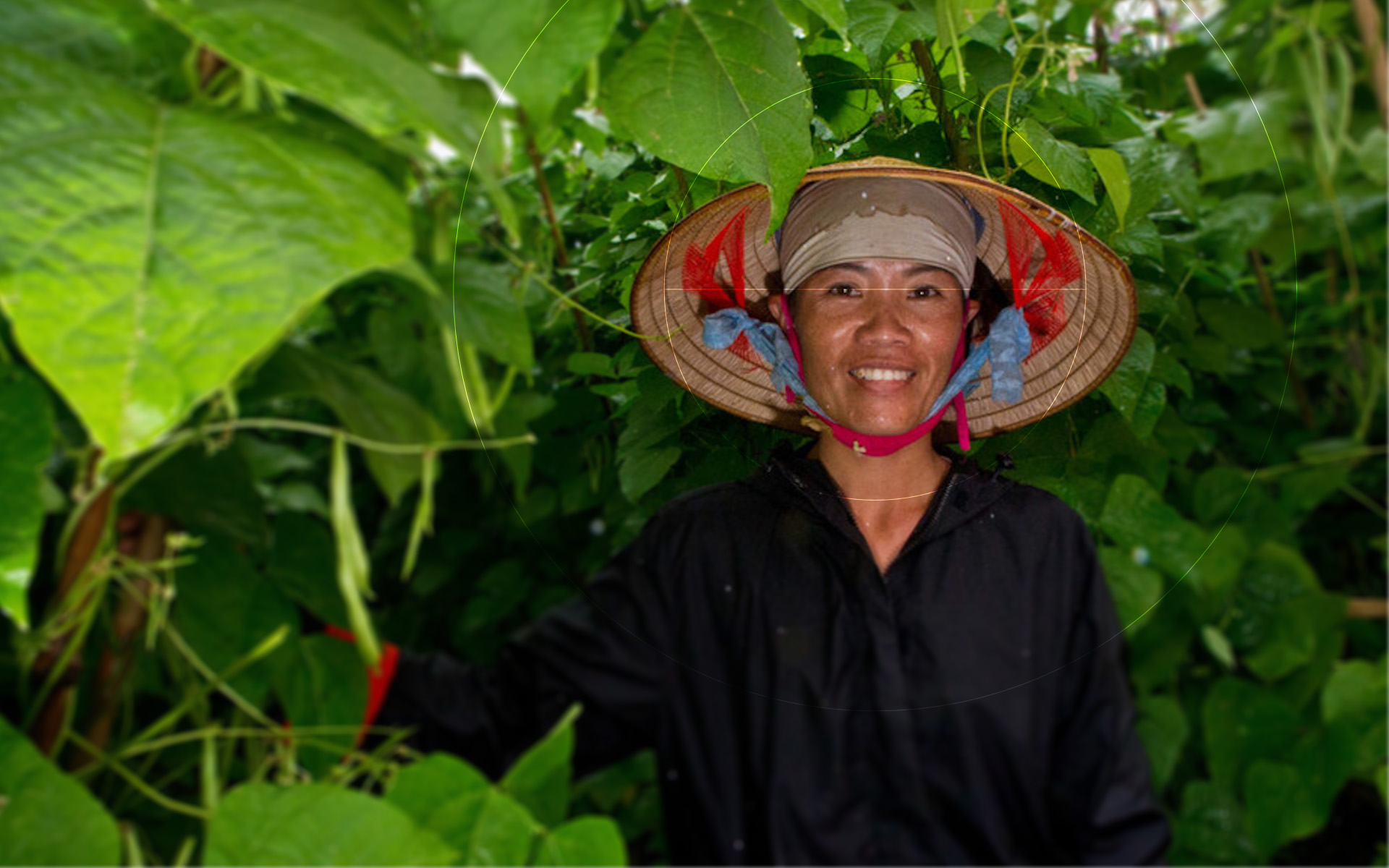A mix of interrelated factors is fueling the food crisis—heat waves, floods, and other extreme weather events induced by climate change; unsustainable farming practices; and food, fertilizer, and fuel price increases partly due to the Russian invasion of Ukraine. To ease the crisis and help achieve food system resilience, ADB’s financing partnerships in 2022 provided emergency assistance and investments in agriculture and natural resources.
Operational Priority Thrusts
ADB’s Strategy 2030 will
- accelerate rural development to improve rural services, increase private sector investments, and drive more jobs in rural areas
- improve efficiency in agricultural value chains to produce and distribute food from farms to consumers; reduce post-harvest losses; increase farmers’ income; and provide sufficient, safe, nutritious, and affordable food
- promote sustainable and resilient food systems to ensure food security by producing more with less resources while addressing food affordability and malnutrition, and promoting nature-based green recovery effectively combined with climate-smart practices
In early 2022, a food security crisis in Asia and the Pacific challenged governments and the development community. The Food and Agriculture Organization Food Price Index, which measures global food prices, hit a record high in March 2022. By May, escalating food prices in Sri Lanka triggered a full-on food security crisis requiring emergency assistance. In August, Pakistan also declared a state of emergency because of floods that left many communities food insecure. Heavy food importers, such as Cambodia, Fiji, Georgia, the Lao People’s Democratic Republic (Lao PDR), Nepal, the Philippines, and Thailand, have been gravely affected. About half of the world’s hungry—300 million people—are living in the region.
In September 2022, ADB announced plans to provide at least $14 billion over 2022–2025 to alleviate the worsening food crisis in the region and improve long-term food security.
With support from its financing partners, ADB quickly responded to food insecurity in Pakistan and Sri Lanka, mainly through repurposing existing project financing or countercyclical fiscal measures. In 2022, ADB, together with its financing partners, cofinanced 36 sovereign projects and technical assistance that align with its Strategy 2030 focus on promoting rural development and food security , and 18 sovereign projects specifically in the agriculture, natural resources, and rural development sector.
The food crisis has highlighted how partnerships in agriculture can be vital to long-term food security in the region. Among ADB’s financing partners, the Global Environment Facility cofinanced the greatest number of projects in the agriculture sector with four projects. The Japan Fund for Prosperous and Resilient Asia and the Pacific and the High-Level Technology Fund cofinanced three projects each. The Asian Infrastructure Investment Bank committed the largest partner cofinancing in the agriculture sector in 2022.
Qingfeng Zhang, chief of ADB’s rural development and food security (agriculture) thematic group, said, “It’s time to rethink the future of agriculture. Invest more in smart solutions, knowledge, and partnerships. Let us go beyond the discussions and collectively act and deliver solutions.”
The Food Security and Livelihood Recovery Emergency Assistance Project is helping people in Sri Lanka overcome a food crisis through cash grants, food vouchers, and livelihood support.
Learn moreInvestments in Agriculture and Food Security
Apart from emergency responses to food insecure countries, ADB’s financing partnerships have made considerable investments in agriculture and food security in 2022 that highlight the use of smart technologies in agricultural value chains, environmental and coastal preservation, and climate-resilient and nature-based solutions.
In Bangladesh, a $157 million ADB loan, complemented by a $17.9 million grant from the Government of the Netherlands, will help reduce flood and riverbank erosion risks. The loan and grant are part of an investment program that aims to strengthen flood and riverbank erosion management to protect agricultural land and communities from annual inundation, disasters, and the impacts of climate change.
In Cambodia, ADB committed a $41 million loan and $22 million grant to increase the climate resilience and sustainability of coastal and marine fisheries. In the coastal provinces of Kampot, Kep, Koh Kong, and Preah Sihanouk, the project aims to reverse the sharp decline in fisheries, promote sustainable mariculture, and enhance fish landing sites to improve seafood safety. The project is expected to benefit 25 community fisheries organizations and 15 community-protected areas, comprising nearly 20,000 households, as well as a wider coastal community of about 200,000 people. ADB partners Agence Française de Developpement and the ASEAN Infrastructure Fund are cofinancing the project with loans of $20 million and $10 million, respectively.
In Nepal, ADB approved a $60 million loan and $10 million grant to enable 30,000 farm households in 100 municipalities of hilly areas in five provinces to develop 10,000 hectares of climate-resilient fruit and nut orchards. The Global Agriculture and Food Security Program is providing grant cofinancing of $9 million. The project is also building the capacities of 10,000 smallholder households on nursery management, vegetable production, and marketing.
In Uzbekistan, ADB approved a $150 million loan and a $3 million grant to help improve food and water security and farm productivity through better land and water resources management. The ADB-administered High-Level Technology Fund, funded by the Government of Japan, is also providing a $300,000 grant to purchase SCADA (supervisory control and data acquisition) equipment, a control system technology used for the overall supervision of machines and processes. The project will benefit farmers by establishing climate-resilient and modernized irrigation systems in the Amu Darya and the Zarafshan River basins, improving on-farm water management, and strengthening policy and institutional capacity for sustainable water resources management.
In Southeast Asia, ADB committed a $12.5 million regional technical assistance (TA) support for project preparation and implementation, capacity building, and policy advice to ongoing and upcoming agriculture and food security projects. ADB financing partners providing support are the Government of Australia’s Department of Foreign Affairs and Trade with $500,000; Global Environment Facility with $138,000; the Japan Fund for Prosperous and Resilient Asia and the Pacific with $2 million; People’s Republic of China Poverty Reduction and Regional Cooperation Fund with $1.5 million; Spanish Cooperation Fund for Technical Assistance with $400,000; and Water Financing Partnership Facility’s Multi-Donor Trust Fund with $150,000.
The TA program covers a wide range of interventions and innovations in different countries. It will support the preparation of projects to strengthen natural resources management and disaster resilience and encourage the development of agribusinesses in Cambodia. In the Philippines, the projects to be supported will focus on agribusiness development, implementation of policy and institutional reforms, and development of a master plan for food chain logistics. The program will also support the development of sustainable aquaculture in Indonesia, strengthen the capacity of the Ministry of Agriculture and Forestry of the Lao PDR, improve water harvesting and agriculture in Timor-Leste, and restore and support sustainable management of coastal forests and climate change adaption in Viet Nam. In the Greater Mekong Subregion, the program is supporting a cross-border project that will help reduce transboundary animal diseases, address food safety and disease risks, and strengthen livestock value chains.
It’s time to rethink the future of agriculture. Invest more in smart solutions, knowledge, and partnerships. Let us go beyond the discussions and collectively act and deliver solutions.
Qingfeng Zhangchief of rural development and food security (agriculture) thematic group, ADB
The Maharashtra Agribusiness Network Project is helping thousands of farmers in India raise their production and incomes using the latest technologies and digital and direct marketing initiatives.
Learn moreToward Long-Term Food Security
ADB’s new commitment to food security, about $14 billion over 2022–2025, will finance a comprehensive program to alleviate the effects of the food crisis on poor and vulnerable populations and promote efforts toward long-term food security for Asia and the Pacific. Specifically, ADB will focus on strengthening the region’s food systems against the impacts of climate change and biodiversity loss. In 2022, ADB’s food security–related commitment reached about $3.7 billion.
To promote long-term food security, ADB’s strategy will focus on actions and innovations to revitalize agriculture, among them, stepping up support for climate-smart agriculture for food system resilience, digitization of agriculture with customized country interventions, and introduction of innovative financing mechanisms to promote nature-based solutions, leading to better agri-food systems and balanced diets.
In March 2022, when food insecurity was more of a threat than a crisis situation, ADB hosted the Asia Pacific Rural Development and Food Security Forum, with partners such as the International Fund for Agricultural Development, Consultative Group on International Agricultural Research, International Rice Research Institute, and the World Vegetable Center. The event called for vigilance on global markets and regional food security, and highlighted the importance of partnerships in developing pathways to sustainable and inclusive food systems.
In the coming years, ADB and its financing partners will work with greater intensity and deepened collaboration toward transformation into more sustainable, resilient, and inclusive food systems in Asia and the Pacific.


